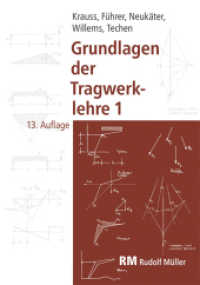- ホーム
- > 洋書
- > ドイツ書
- > Social Sciences, Jurisprudence & Economy
- > Media & Communication
- > communication science
Full Description
This book examines interculturality in education in Ecuador at the crossroads between an educational model inherited from the colonial past, which still represents white and mestizo hegemony, and a vision of an alternative form of decolonizing education that contributes to the development of an intercultural and plurinational state, as promised in the Ecuadorian Constitution. Championing indigenous voices and discussing the role of education in the fight against poverty and in the recovery of cultural and ecological diversity, the authors propose that quality education for all, a target of the Sustainable Development Goals, should move out of the commonly defined models of technological modernization and cultural globalization that disvalue knowledge from other cultures. Through their analysis of practical experimentations of indigenous and intercultural education in Amazonian schools and universities, they conclude that enhanced preservation of indigenous languages, cultures and ecological knowledge prove fundamental prerequisites for biological conservation and strengthening societies' resilience to climate change threats.
Contents
Chapter 1: introduction: Education as cultural and ecological revitalization among Amazonian nationalities.- Chapter 2 - Public education policies and the struggle of the Indigenous movement for a decolonial interculturality.- Chapter 3 - Characteristics of the inclusion of Indigenous peoples in the school system.- Chapter 4 - From discourse to structure: interculturality in Amazonian universities.- Chapter 5 - Intercultural education and agency of Indigenous communities: a view from the Sapara territory.- Chapter 6 - Indigenous young people's access to schools in the province of Pastaza.- Chapter 7 - Educational experiential calendars: creating links between Indigenous communities and high school.- Chapter 8 - Interculturality in the classroom: accompanying students from minority cultures in Pastaza.- Chapter 9 - Participatory Design interventions: supporting university student care networks in times of Covid.








